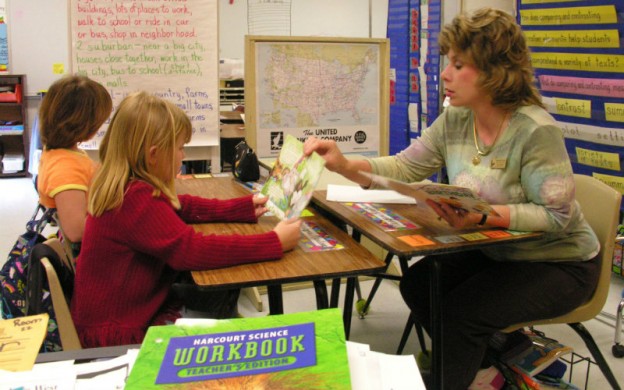
Between A Rock And A Hard Place: The Role of Paraprofessionals In Special Education
One of the hottest topics in special education today is the role of paraprofessionals in special education. As more and more students with special needs make the transition into general education classrooms, school budgets are being slashed and class sizes are getting larger. Many school districts opt for paraprofessionals, non-certified teaching assistants often referred to as “parapros,” to provide extra support in the classroom.
The case against Parapros
The disadvantages of parapros assigned to students with special needs are well-documented in educational research:
- automatically marks a student as “disabled”
- prevents student’s independence
- complex educational decisions being made by non-certified educators who are not required to have 4 year college degrees
- prevents interaction with peers
- prevents interaction with lead teacher who is certified and does have a 4 year college degree
- increases behavior problems
My Personal Experiences
Well, my son Louie has a one-on-one parapro for most of his academic classes, and we’ve encountered every one of these problems...and other problems, too. Back in second grade he had an overly helpful parapro who secretly intercepted my weekly updates to the speech therapist (which the speech therapist had requested from me). In another year, a parapro put aside all of Louie’s school supplies on the first day of school, and his teachers kept sending notes home saying that my son had no school supplies. Yet another parapro once told my son that he didn’t have to do certain math assignments because “they’re too hard for you.”
But my heart almost stopped when I heard the school district’s special ed director explain that she was reviewing the use of parapros, “because one-on-one support is actually the most restrictive environment, which is not what we want for our students.” Deep down, I want to keep the parapros with Louie for as long as possible. In a rare unanimity of opinion, Louie’s medical team and school team share the same desire. The reason is that the parapros do much more right than wrong:
The Benefits of Paraprofessionals
- They keep my son talking, interacting and thinking about what is happening around him
- They repeat what the teacher said and re-explain each step of an assignment
- They monitor his environment to make sure he isn’t overwhelmed or anxious
- They prepare materials for him and show him how to organize
- They share information with me so that I can help my son finish work at home
Without this type of support, my Louie would not be able to function in general education. In past years, there was a parapro assigned to his classroom (but not to him) for part of the day, and he failed to retain academic information for 2 years. He tried a co-taught math class for one semester last year, but the 2 teachers were spread too thin, and he needed more individualized instruction.
This year he has one-on-one parapro support for math, and he is able to take math tests without modifications. He is starting to take unmodified tests in science and foreign language, too, thanks in large part to his parapros.
The Case for having more than one Parapro
Yes, he has more than one parapro. To reduce dependence on any particular person, the parapros at his school rotate among the students. So Mrs. B helps him with science, Mr. R accompanies him to German and Mrs. D attends social studies with him. Mostly they monitor him as he works independently and jump in only when necessary. During a test or quiz, they take Louie to a separate room without distractions.
In the past year I’ve seen a dramatic increase in Louie’s independence and self-confidence, and I think the parapros have played a large role in that growth. They reduce my son’s confusion and negative self-talk with their constant encouragement. They make things possible that Louie would have been afraid to try on his own.
Have a Parapro so one day you won't need a parapro
Last summer I even hired one of the parapros as a tutor at home, which turned out to be the perfect bridge between June and September. Before school let out, the parapro consulted with each of Louie’s teachers to identify summer goals, and she systematically worked through the material to make sure that Louie retained and developed his skills and knowledge. As much as I wish my son didn’t need parapro support, I feel blessed to have such generous and optimistic spirits in our lives.
My son is in seventh grade, and he already attends his elective classes in general education without a parapro. I’m looking forward to the day when he no longer needs a parapro for any class. But for now, it takes an army of teachers, parapros and therapists to teach a child like Louie!
Give us your opinion of Parapros or share your experiences in the comments below.
Photo Credit: Old Shoe Woman



